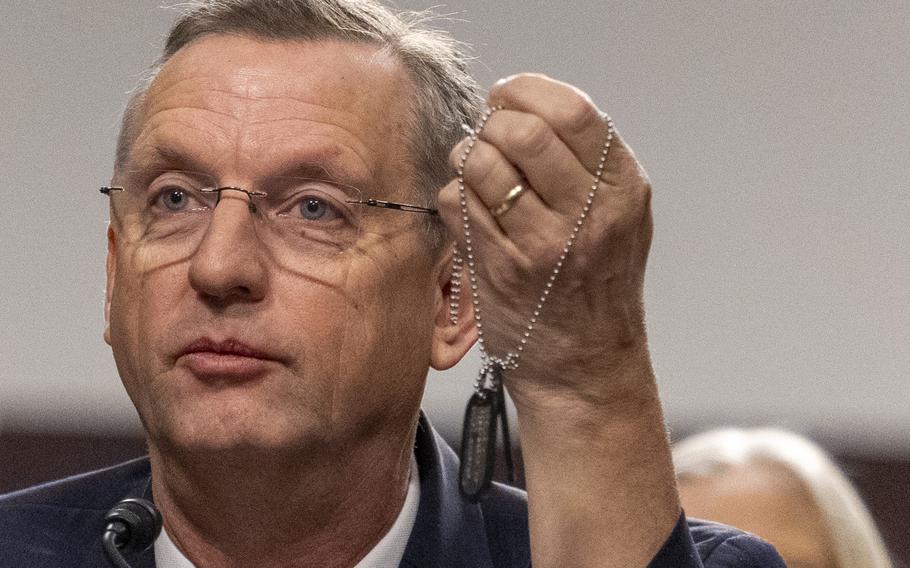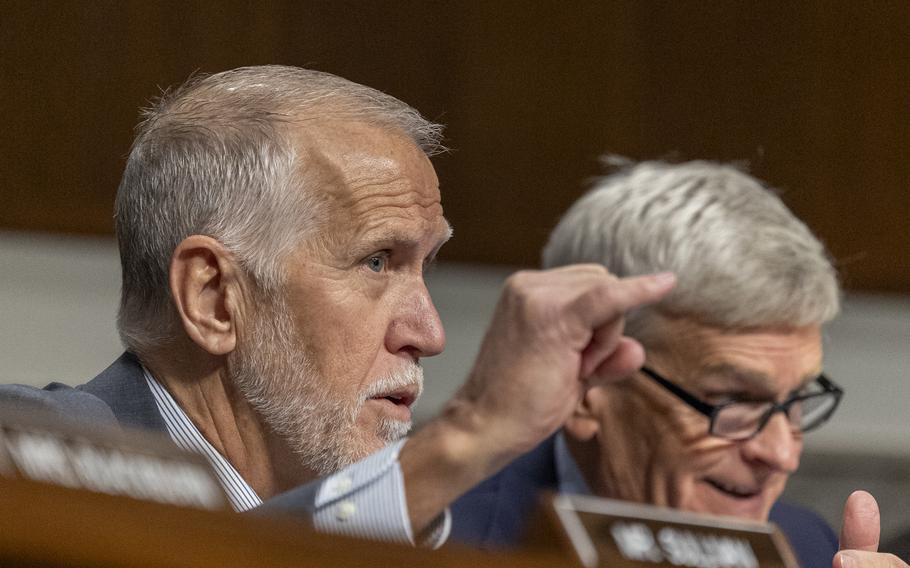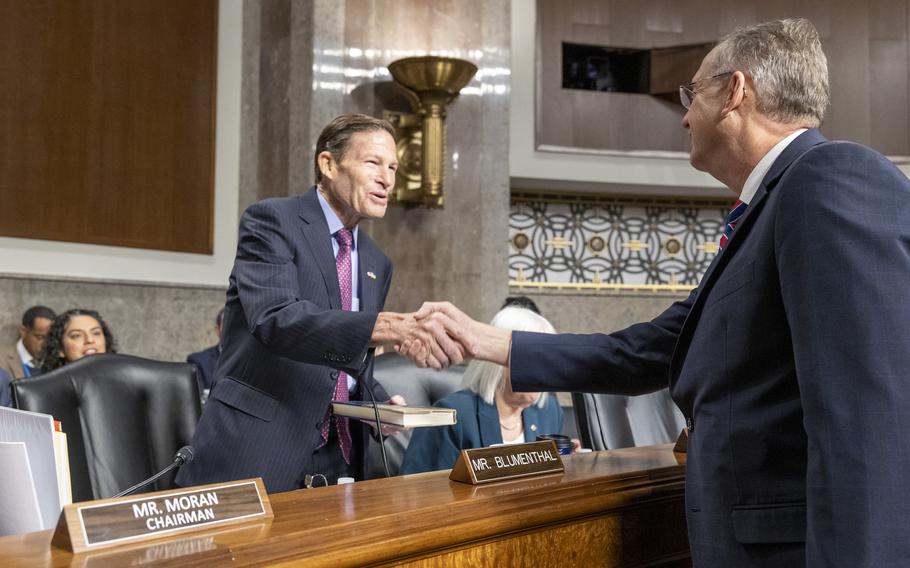
Doug Collins, the nominee to be the next Department of Veterans Affairs secretary, holds up his dog tags on Tuesday, Jan. 21, 2025, during his confirmation hearing before the Senate Committee on Veterans’ Affairs in Washington. (Eric Kayne/Stars and Stripes)
President Donald Trump’s nominee to run the Department of Veterans Affairs pledged Tuesday to protect veterans benefits from potential funding cuts as PACT Act enrollments and increased emphasis on health care from private doctors drive spending.
“All I was told by the president is to take care of our veterans,” Doug Collins told the Senate Veterans’ Affairs Committee during his confirmation hearing. “We’re not going to sacrifice the veterans benefits to do a budget. … I wouldn’t go to a place in which we’re not doing the mission. The mission is veterans.”
Collins, 58, an Air Force Reserve colonel and military chaplain from Georgia who served as a Republican House lawmaker from 2013 to 2020, received a relatively warm bipartisan reception during the hearing. The committee will hold an executive session Thursday, where they could approve Collins for the job and send his confirmation to the full Senate for a vote.
If confirmed, he will lead a sprawling agency with a $369 billion budget and nearly 400,000 employees who provide health care, disability compensation and other benefits to 18 million veterans.
Sen. Jerry Moran, R-Kan., the committee chairman, said lawmakers have received letters of support for Collins’ nomination from many veterans organizations, including the Wounded Warrior Project, AMVETS, Mission Roll Call, Burn Pits 360, Jewish War Veterans and the Military Order of the Purple Heart.
Senators focused their questions to Collins on several long-standing challenges that have plagued the department, including how he would manage veterans’ access to health care when it is unavailable at the VA because of geography or wait times. They also asked how he will manage two recent costly laws that provide increased care for some veterans as a new administration takes power and is adamant on reducing government spending.
Sen. Bernie Sanders, I-Vt., said the cost for providing veterans who need private community care went from $8 billion in 2014 to $31 billion by 2024.
“What the debate comes down to is not whether somebody should be able to access community care, but where are we going to put our resources? Are we going to allow the VA to wither on the vine, so to speak?” Sanders asked.
The Sgt. 1st Class Heath Robinson Honoring Our Promise to Address Comprehensive Toxics Act, or PACT Act, became law in 2022 and extended benefits including health care and disability compensation to former service members who developed illnesses following exposure to hazardous materials while on active duty.
The Elizabeth Dole Home Care Act passed last month and gives severely ill and aging veterans access to convalescent care in their own home.
While the PACT Act has already delivered new disability benefits to more than 1 million veterans, it has come with a more than $2 billion price tag for just the first four years of implementation, according to the Congressional Budget Office. An estimate for the Dole Act is about $1.7 billion.
“How will you make sure the VA toxic exposure fund remains viable for years to come, while providing the levels of care our veterans have earned?” asked Sen. John Boozman, R-Ark.
Collins responded: “The biggest thing we’ve got to do is actually look at what has passed here. … Are we at the VA making sure that we’re getting good information and doing what the intent of the law was, so that they can continue to get those benefits?”
Senators also questioned how he would fix the VA’s bungled rollout of electronic health records and improve the handoff of medical care from the Defense Department to the VA.

Sen. Thom Tillis, R-N.C., asks Doug Collins to “pinky swear” on Tuesday, Jan. 21, 2025, during his Senate confirmation hearing that he won’t privatize the Department of Veterans Affairs. Collins is nominated to be the next VA secretary. (Eric Kayne/Stars and Stripes)
“The implementation of the electronic health record is a bipartisan, multi-administration disaster,” said Sen. Thom Tillis, R-N.C. “Do I have your commitment to go through that program to quickly get it moving again and get an integrated health chart that also can integrate with the DOD, so that we can finally have a seamless transition from active status or Reserve status to veteran status and provide premium care at the VA?”
“Yes, Sen. Tillis, and the reason is this — what you just said about seamless care. It’s actually a safety and security issue for my veterans,” Collins said.
When service members can move quickly into the VA’s system, it can speed up access to disability benefits and life-saving mental health care when there is a risk of death by suicide, he said.
The transition should feel like a “warm hug,” Collins said.

Doug Collins, right, greets Sen. Richard Blumenthal, D-Conn., on Tuesday, Jan. 21, 2025, before his Senate confirmation hearing. Collins is nominated to be the next VA secretary. (Eric Kayne/Stars and Stripes)
Sen. Richard Blumenthal, D-Conn., questioned Collins on brand new initiatives from the Trump administration to freeze hiring in the federal government and return all employees to in-person work. Collins said he is still looking at the changes implemented Monday and how it will affect the workforce.
“That’s not reassuring to me,” Blumenthal said. “There are extraordinary problems in recruiting and retaining the right doctors, the nurses, and filling their ranks where there are openings right now. So the explicit language of that memorandum seems to include them in the hiring freeze.”
The only major sticking point that Collins faced from Democrats came in questioning on women’s access to abortions through the VA.
Sens. Patty Murray, D-Wash., and Mazie Hirono, D-Hawaii, questioned him on whether he would preserve abortion access available to veterans in instances of rape, incest or to protect the life of the mother.
“We will be looking at that issue when I get in there to confirm that the VA is actually following the law,” he said.